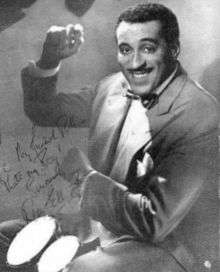Ray Ellington
| Ray Ellington | |
|---|---|
 Ray Ellington | |
| Background information | |
| Birth name | Henry Pitts Brown |
| Born |
17 March 1916[1] Kennington, London, England |
| Origin | England |
| Died |
27 February 1985 (aged 69)[2] England |
| Genres | Jazz, blues |
| Occupation(s) | singer, drummer, bandleader |
| Instruments | drums |
Henry Pitts Brown (17 March 1916 – 27 February 1985),[2] known professionally as Ray Ellington, was a popular English singer, drummer and bandleader. He is best known for his appearances on The Goon Show from 1951 to 1960. The Ray Ellington Quartet had a regular musical segment on the show, and Ellington also had a small speaking role in many episodes, often as a parodic African, Native American or Arab chieftain (but also often, with no attempt to change his normal accent, as a female secretary or a Scotsman).
Early life
Ellington was born Henry Pitts Brown, at 155 Kennington Road, Kennington, London, the youngest of four children. His father was Harry Pitts Brown (c.1877–1920), an African-American music-hall comedian and entertainer, his mother was Eva Stenkell Rosenthal (b. c.1879), a Russian Jew. His father died when Brown was four years old. Ellington was brought up as a strictly Orthodox Jew and attended the South London Jewish School (1924–30), before entering show business at the age of twelve, when he appeared in an acting role on the London stage.[3]
Life and career
Ellington's first break came in 1937 when he joined Harry Roy and His Orchestra as the band's drummer, replacing Joe Daniels. His vocal talents were put to good use too, from the time of his first session when he recorded "Swing for Sale." Ellington was called up in May 1940 when he joined the Royal Air Force (RAF) as a physical training instructor where he served throughout the war. He played in various service bands including RAF Blue Eagles (1945).
After demobilisation, Ellington resumed his career, fronting his own group, playing at The Bag O'Nails club. Early in 1947, he rejoined the Harry Roy band for a few months.[4]
Ellington specialised in jazz but experimented with many other genres throughout the show's history and his musical style was heavily influenced by the comedic jump blues of Louis Jordan. Ellington's band was one of the first in the UK to feature the stripped-back guitar/bass/drums/piano format that became the basis of rock and roll, as well as being one of the first groups in Britain to prominently feature the electric guitar. They were also reputedly the first jazz band in the UK to use an amplified guitar, which was produced and introduced by their guitar player, Lauderic Caton. The other members of Ellington's quartet were Dick Katz (piano) and Coleridge Goode (bass).
Early in the Goon Show's run, there were many jokes linking Ellington to the African nation of Ghana, thus leading Ellington to say that he came from Ghana. Ellington's recording of "The Madison" reached #36 in the UK Singles Chart in November 1962.[2]
He was married to Anita West, who was to become the second female presenter of Blue Peter when she replaced Leila Williams, but she only lasted a few weeks in this role. They had two small children (Lance and Nina) when the marriage ended in divorce, due to Ellington's constant touring.[5]
Ray's son Lance Ellington is a singer who has recorded several jazz-oriented albums,[6] and is one of the backing singers in the BBC show Strictly Come Dancing.[7] Lance Ellington also appeared in tributes to Peter Sellers and in the film The Life and Death of Peter Sellers, where he played his father.
Ray Ellington died of cancer on 27 February 1985.[2][5]
References
- ↑ Chilton, John (1997). Who's Who of British Jazz (2nd ed.). Continuum International Publishing. p. 120. ISBN 978-0826472342.
- 1 2 3 4 Roberts, David (2006). British Hit Singles & Albums (19th ed.). London: Guinness World Records Limited. p. 182. ISBN 1-904994-10-5.
- ↑ The Rough Guide to Jazz Retrieved 21 December 2010
- ↑ Goon Show Preservation Society
- 1 2 Gwyneth Rees (11 October 2008). "Meet the forgotten Blue Peter presenter who quit over divorce shame | Mail Online". Dailymail.co.uk. Retrieved 11 May 2012.
- ↑ Lanceellington.com
- ↑ News item Retrieved 20 December 2010
External links
- Ray Ellington at the Internet Movie Database
- "Ray Ellington". The Goon Characters. Goon Show Preservation Society. 2006. Retrieved 18 March 2007.
- The Spike Milligan Tribute Site
- The Spike Milligan Appreciation Society